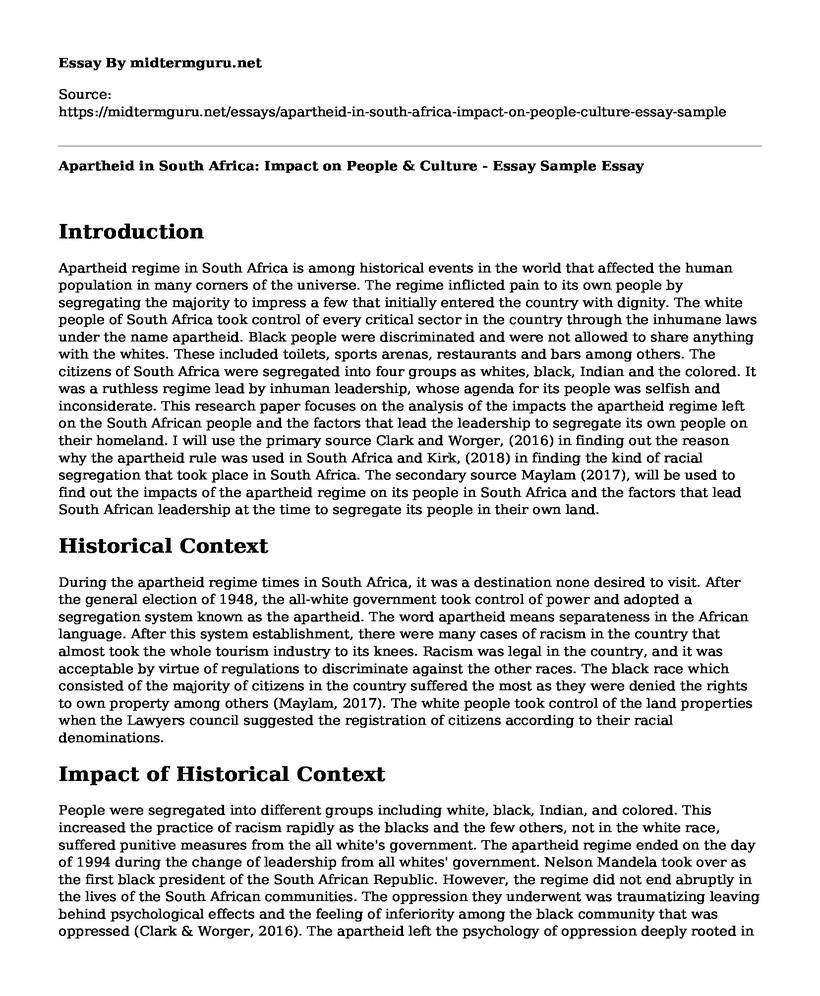Introduction
Apartheid regime in South Africa is among historical events in the world that affected the human population in many corners of the universe. The regime inflicted pain to its own people by segregating the majority to impress a few that initially entered the country with dignity. The white people of South Africa took control of every critical sector in the country through the inhumane laws under the name apartheid. Black people were discriminated and were not allowed to share anything with the whites. These included toilets, sports arenas, restaurants and bars among others. The citizens of South Africa were segregated into four groups as whites, black, Indian and the colored. It was a ruthless regime lead by inhuman leadership, whose agenda for its people was selfish and inconsiderate. This research paper focuses on the analysis of the impacts the apartheid regime left on the South African people and the factors that lead the leadership to segregate its own people on their homeland. I will use the primary source Clark and Worger, (2016) in finding out the reason why the apartheid rule was used in South Africa and Kirk, (2018) in finding the kind of racial segregation that took place in South Africa. The secondary source Maylam (2017), will be used to find out the impacts of the apartheid regime on its people in South Africa and the factors that lead South African leadership at the time to segregate its people in their own land.
Historical Context
During the apartheid regime times in South Africa, it was a destination none desired to visit. After the general election of 1948, the all-white government took control of power and adopted a segregation system known as the apartheid. The word apartheid means separateness in the African language. After this system establishment, there were many cases of racism in the country that almost took the whole tourism industry to its knees. Racism was legal in the country, and it was acceptable by virtue of regulations to discriminate against the other races. The black race which consisted of the majority of citizens in the country suffered the most as they were denied the rights to own property among others (Maylam, 2017). The white people took control of the land properties when the Lawyers council suggested the registration of citizens according to their racial denominations.
Impact of Historical Context
People were segregated into different groups including white, black, Indian, and colored. This increased the practice of racism rapidly as the blacks and the few others, not in the white race, suffered punitive measures from the all white's government. The apartheid regime ended on the day of 1994 during the change of leadership from all whites' government. Nelson Mandela took over as the first black president of the South African Republic. However, the regime did not end abruptly in the lives of the South African communities. The oppression they underwent was traumatizing leaving behind psychological effects and the feeling of inferiority among the black community that was oppressed (Clark & Worger, 2016). The apartheid left the psychology of oppression deeply rooted in the discriminated black race that proved difficult to let go. The economic effects had taken roots in the society and most of the blacks lived in poverty with nothing to show for their fight for freedom (Maylam, 2017). This economical imbalance became a challenge to offset up to date the white boast of a better economy control shares in South Africa. In this regard, the apartheid rule affected the South Africans negatively and left a national wound that will take years to heal.
References
Clark, N. L., & Worger, W. H. (2016). South Africa: The rise and fall of apartheid. New York: Routledge.
Maylam, P. (2017). South Africa's racial past: The history and historiography of racism, segregation, and apartheid. New York: Routledge.
Cite this page
Apartheid in South Africa: Impact on People & Culture - Essay Sample. (2023, Jan 01). Retrieved from https://midtermguru.com/essays/apartheid-in-south-africa-impact-on-people-culture-essay-sample
If you are the original author of this essay and no longer wish to have it published on the midtermguru.com website, please click below to request its removal:
- Taking Back the Schools Review Example
- History Essay Example: Roman Civilization
- Elements of Good Governance - Paper Example
- Essay Sample on Mining and the Need of Minerals
- Slave Trade and the Functioning of Enlightenment - Essay Sample
- Athens & Sparta: Similarities & Differences - Essay Sample
- Gold Standard Healthcare in France: 80% Coverage for All - Essay Sample







